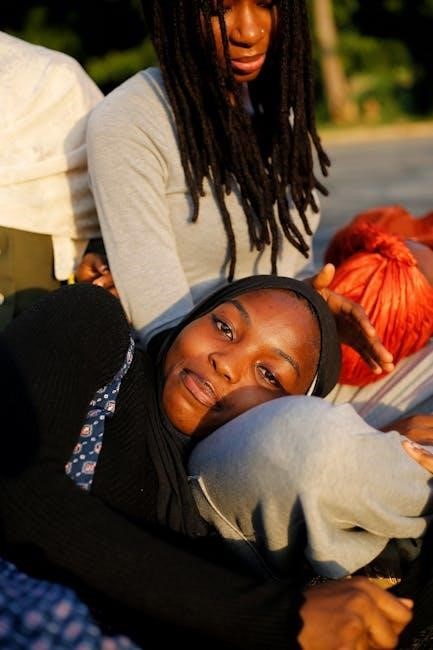Black Magick harnesses intense energy to influence situations, often bending free will. It’s not inherently evil but a forceful form of magick, contrasting with gentler White Magick.
1.1 Definition and Overview
Black Magick refers to the practice of harnessing powerful, often darker forms of energy to achieve specific, sometimes controversial, outcomes. Unlike White Magick, which focuses on benevolent intentions, Black Magick is characterized by its direct and forceful nature, often involving the manipulation of situations, people, or energies. It is not inherently evil but rather a method that operates outside conventional moral boundaries. Practitioners of Black Magick often seek to bend or break free will, influencing events to align with their desires. This practice is frequently associated with occult rituals, spells, and incantations, drawing from ancient traditions and forbidden knowledge. Despite its controversial reputation, Black Magick remains a fascinating and complex aspect of occultism, attracting both practitioners and critics alike.
1.2 Historical Context
Black Magick has its roots in ancient civilizations, where magic was often intertwined with religion and spirituality. Early practices involved rituals and spells to influence divine forces, with evidence found in Egyptian hieroglyphs and Babylonian texts; These societies viewed magic as a powerful tool, capable of shaping destiny and manipulating the physical world. As Christianity rose, Black Magick became associated with heresy and evil, leading to widespread persecution during the Middle Ages. The Church condemned such practices, linking them to Satanism and dark forces. Despite this, secret societies and occult traditions preserved Black Magick, passing down forbidden knowledge through grimoires and oral traditions. The modern era saw figures like Aleister Crowley popularize Black Magick, blending it with ritualistic and symbolic practices. Historical context reveals Black Magick as a persistent, evolving force in human culture.

History of Black Magic

Black Magic’s history traces back to ancient civilizations, evolving through the Middle Ages, and experiencing a modern resurgence, shaping its mystical and often controversial legacy.
2.1 Ancient Civilizations and Black Magic

Ancient civilizations, such as Egypt, Mesopotamia, and China, practiced black magic through spells, incantations, and rituals. These practices often intertwined with religious beliefs, aiming to control forces of nature, curses, or divine favor. Egyptian texts like the Book of the Dead contained spells to manipulate the afterlife, while Mesopotamian tablets described rituals to ward off demons. In China, black magic was linked to Taoist practices, focusing on balancing energies. These early societies viewed black magic as a powerful yet dangerous tool, often associated with taboo and moral ambiguity. Its use was frequently tied to societal hierarchies, with priests and shamans wielding such powers. Over time, these practices evolved, shaping the cultural and religious perceptions of black magic that persist today.

2.2 Black Magic in the Middle Ages
During the Middle Ages, black magic became deeply intertwined with religious persecution and societal fear. The Catholic Church condemned it as heresy, leading to widespread witch hunts and inquisitions. Many accused of practicing black magic were tortured, executed, or forced into hiding. Rituals often involved alleged pacts with the devil, human sacrifices, and dark ceremonies. The Malleus Maleficarum, a 15th-century treatise, fueled hysteria by detailing witch-hunting methods. Despite the repression, secret societies and practitioners continued to explore forbidden knowledge, blending pagan traditions with Christian symbolism. This period solidified black magic’s association with evil, influencing cultural narratives that persists today. The fear of black magic shaped medieval society, creating a legacy of mistrust and persecution that echoes through history. Its impact on law, religion, and folklore remains profound.
Modern Practices of Black Magick
Modern black magick involves contemporary rituals, spellcasting, and energy manipulation. Practitioners often blend traditional techniques with modern spiritual and psychological frameworks, adapting to cultural and technological advancements.
3.1 Rituals and Spells
Modern black magick rituals often involve intricate ceremonies to channel and manipulate energy. These practices may include chants, symbolic gestures, and the use of specific tools like candles, herbs, or gemstones. Spells are typically designed to achieve precise outcomes, such as influencing others, altering circumstances, or gaining power. Practitioners frequently incorporate elements of psychology and intention-setting to amplify their spells’ effectiveness. While some rituals are solitary, others involve groups to enhance collective energy. The adaptation of traditional methods to contemporary contexts allows modern practitioners to align their craft with personal beliefs and societal changes. These rituals and spells reflect a blend of ancient wisdom and modern innovation, making black magick a dynamic and evolving practice.
3.2 Influence of Black Magick on Modern Culture
Black magick has left an indelible mark on modern culture, inspiring art, music, and literature. The Australian band Black Magick SS, for instance, blends occult themes with psychedelic rock, creating a unique sound that captivates audiences. Their visuals, combining Nazi aesthetics with psychedelic elements, spark both fascination and controversy. Similarly, black magick’s mystique influences filmmakers and writers, who often portray it as a powerful, albeit dangerous, force. In technology, Blackmagic Design cameras are widely used in filmmaking, symbolizing the allure of “black magic” in innovation. This duality—between the occult and the modern—reflects black magick’s enduring appeal, as it continues to inspire creativity while remaining shrouded in mystery and debate.

Cultural and Media References
Black magick influences music, film, and tech, with Black Magick SS blending occult themes and Blackmagic Design cameras symbolizing its cultural and technological impact.
4.1 The Band Black Magick SS

Black Magick SS is an Australian occult-themed band formed in 2012, known for blending black metal, psychedelic rock, and synthesizer music. Their unique style combines dark, mystical lyrics with visually striking imagery, merging Nazi Germany aesthetics and psychedelic art. The band has gained a distinctive reputation for creating the “Magick Metal” subgenre, which reflects their exploration of occult themes and experimental sound. Their 2020 album, Rainbow Nights, showcases tracks like The Black Abyss and Black Magick Army, emphasizing their blending of intense energy and mystical narratives. Black Magick SS’s music and visuals have captivated audiences, making them a standout in both underground and experimental music scenes.
4.2 Black Magic in Literature and Film

Black magic has captivated audiences in literature and film, often portrayed as a mysterious and terrifying force. In literature, works like The Da Vinci Code and Harry Potter series explore its mystical allure and moral dilemmas. Films such as The Craft and Rosemary’s Baby depict black magic as a powerful yet dangerous art, often tied to themes of obsession and sacrifice. These narratives frequently highlight the fine line between good and evil, showcasing black magic’s ability to inspire both fascination and fear. By blending horror and mystery, these works keep the concept of black magic culturally relevant, reflecting humanity’s enduring intrigue with the unknown and the supernatural.
Legal and Ethical Considerations
Black magick raises legal and ethical debates, with cases involving occult practices and moral concerns. Laws vary globally, balancing power and responsibility.
5.1 Legal Cases Involving Black Magic
Legal cases involving black magic often highlight societal fears and ethical dilemmas. In Kerala, India, the High Court sought clarification on laws prohibiting black magic and inhuman rituals, reflecting ongoing debates. Courts worldwide have addressed cases linking black magic to crimes like human sacrifice, sorcery, and manipulation. These cases underscore the challenge of defining and regulating practices that blend spirituality, superstition, and criminal intent. Legal systems struggle to balance freedom of belief with protecting individuals from exploitation. Some jurisdictions impose strict penalties, while others avoid explicit bans, fearing misuse of laws against marginalized groups. Legal battles reveal the tension between cultural traditions and modern jurisprudence.
5.2 Ethical Debates Surrounding Black Magick
Ethical debates surrounding Black Magick center on its potential for harm and manipulation. Critics argue it violates moral codes by bending free will and exploiting vulnerabilities. Spiritual practitioners warn of severe consequences, emphasizing the importance of intent and responsibility. Some view Black Magick as a tool for self-empowerment, while others condemn its association with exploitation and darkness. The line between personal freedom and ethical accountability is often blurred, sparking intense discussions. Cultural and religious perspectives further complicate these debates, as some traditions condone its use for protection or justice, while others outright reject it. The ethical responsibility of practitioners remains a contentious issue, with many urging caution and mindfulness to avoid perpetuating harm.

Resources and Further Reading
Explore recommended grimoires, books, and online forums for deeper insights into Black Magick. Discover resources like “The Black Magick Grimoire” and join occult communities for shared knowledge.
6.1 Recommended Grimoires and Books
For those seeking deeper knowledge, several grimoires and books are highly recommended. The Black Magick Grimoire is a comprehensive guide to rituals and spells, offering practical insights. Aleister Crowley’s works, such as The Book of the Law and Magick in Theory and Practice, are foundational for understanding occult principles. Magickal Seduction by Damon Thompson explores using magick for attraction and romance. These texts provide valuable wisdom for both beginners and advanced practitioners, covering historical context, ethical considerations, and modern applications of Black Magick.
- The Black Magick Grimoire: A detailed guide to rituals and spells.
- The Book of the Law and Magick in Theory and Practice: Essential works by Aleister Crowley.
- Magickal Seduction: Focuses on using magick for love and attraction.
6.2 Online Communities and Forums
Exploring online communities and forums can provide valuable insights and connections for those interested in Black Magick. Platforms like Reddit host dedicated groups where practitioners share knowledge, discuss rituals, and offer guidance. Facebook groups and specialized occult forums also serve as hubs for learning and networking. These spaces often include discussions on ethics, spell-casting, and personal experiences. Additionally, many websites offer downloadable resources, such as PDF guides and grimoires, to deepen understanding. Engaging with these communities can enhance one’s journey into Black Magick, offering both support and a wealth of information.
- Reddit: Active communities for occult discussions and resource sharing.
- Facebook groups: Focused forums for practitioners to connect and learn.
- Specialized forums: Dive into detailed conversations on Black Magick practices.



